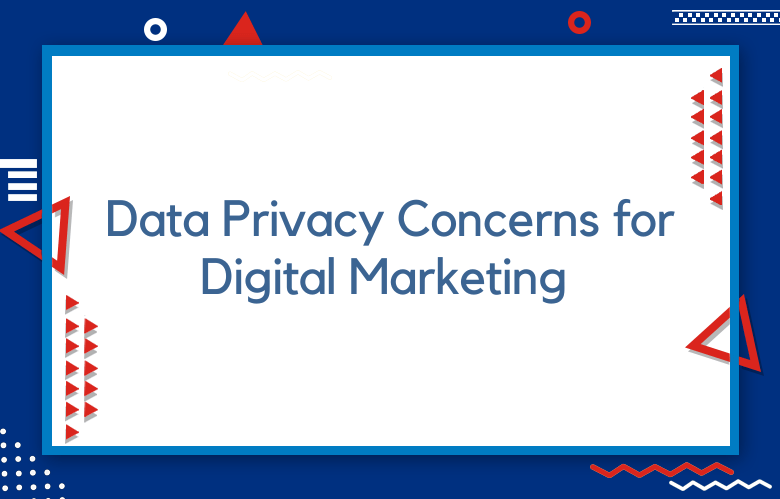Data Privacy Concerns for Digital Marketing Best Practices & Strategies

Data privacy concerns have taken center stage in the digital marketing landscape, where vast amounts of consumer data are collected and analyzed to drive personalized campaigns and strategies.
With increasing consumer awareness about how their data is used and a growing number of regulations, such as GDPR in Europe and CCPA in California, addressing data privacy is not just a legal obligation but also a crucial element of building trust and credibility with audiences.
Data Privacy Concerns for Digital Marketing: Best Practices & Strategies
Best practices and strategies in digital marketing now need to navigate the delicate balance between leveraging data for targeted marketing efforts and respecting individual privacy rights. This involves transparent communication about data collection and usage, ensuring secure data storage and handling, obtaining explicit consent from users, and providing them with control over their data, including accessible options for opting out and accessing the information held about them.
Moreover, marketers are tasked with staying abreast of changing regulations and technological advancements that can impact data privacy, such as cookies, the rise of privacy-preserving technologies, and consumer attitudes toward data sharing.
In this environment, adopting a privacy-first approach in digital marketing strategies is about compliance and differentiating the brand as one that values and protects its customers’ privacy. This commitment to privacy can enhance customer loyalty, open new opportunities for engagement, and ultimately drive more sustainable marketing results.
- Key Takeaways
- Data Privacy Landscape Overview
- Key Data Privacy Concerns
- Understanding Digital Marketing Compliance
- Strategies for Safeguarding Consumer Data
- Best Practices for Privacy Compliance
- Impact on Digital Marketing Strategies
- Adapting to Privacy-Focused Marketing
- Mitigating Data Breach Risks
- Enhancing Digital Security Measures
- Closing Thoughts
- Frequently Asked Questions
- What are the primary data privacy concerns for digital marketing?
- How can businesses safeguard consumer data in digital marketing practices?
- How does data privacy compliance impact digital marketing strategies?
- What are some critical strategies for adapting to privacy-focused marketing approaches?
- How can businesses mitigate the risks of a potential data breach in their digital marketing activities?
Are you concerned about your data privacy in digital marketing? Your worries are valid. As technology advances, so do the risks associated with personal information online, data practices, data use, and businesses collecting data. Stay informed and empowered as we explore the implications and safeguards surrounding your online data.
Key Takeaways
Prioritize Data Protection
Safeguard consumer data by implementing encryption, access controls, and regular security audits to mitigate risks.
Stay Compliant
Understand digital marketing regulations like GDPR and CCPA to ensure compliance, build customer trust, and protect personal data.
Adapt Marketing Strategies
Shift towards privacy-focused marketing by obtaining explicit consent, being transparent about data usage, and offering opt-out options.
Enhance Security Measures
Strengthen digital security by investing in robust cybersecurity tools, conducting employee training, and establishing incident response plans.
Monitor Data Handling
Regularly audit data collection practices, review third-party data-sharing agreements, and update privacy policies to align with evolving regulations.
Engage in Continuous Learning
To adapt marketing strategies effectively, keep abreast of changing data privacy laws, industry best practices, and consumer expectations.
Data Privacy Landscape Overview
Evolution
Data privacy concerns in digital marketing for businesses have evolved significantly. Initially, companies collected user data without explicit consent, leading to privacy violations. As technology advanced, so did the data collection methods by businesses, raising more privacy red flags.
The evolution of data privacy concerns among businesses can be traced back to the early days of online advertising when user tracking was less regulated. Over time, consumers became more aware of how their data was used and demanded greater transparency from businesses. This shift in consumer awareness forced companies to reevaluate their data collection practices.
Impact
High-profile data breaches, such as the Cambridge Analytica scandal, have profoundly impacted consumer trust in digital marketing. Instances where personal information is mishandled or leaked erode trust between consumers and businesses. These breaches damage businesses’ reputations and lead to legal repercussions.
The fallout from these breaches extends beyond individual companies and businesses to the entire digital marketing industry. Consumers are now more cautious about sharing their personal information online, affecting how businesses collect and utilize data for marketing purposes. This heightened scrutiny has pushed firms to prioritize data protection measures to rebuild consumer trust.
Regulations
Regulations like the General Data Protection Regulation (GDPR) and the California Consumer Privacy Act (CCPA) are crucial in shaping data privacy practices in digital marketing. These regulations set standards for how businesses handle consumer data, emphasizing transparency and accountability. By imposing fines for non-compliance, GDPR and CCPA act as deterrents against careless handling of personal information.
GDPR, implemented in 2018, applies to all companies operating within the EU or targeting EU citizens and handling personal data. It requires businesses to obtain explicit consent before collecting personal data and gives individuals greater control over their information. Similarly, CCPA grants California residents specific rights regarding their personal information held by businesses operating in the state.
Key Data Privacy Concerns
Primary Challenges
When handling sensitive information and personal data, digital marketers face key data privacy concerns. Ensuring compliance with regulations like GDPR and CCPA, which involve personal data, poses a significant challenge for businesses.
The increasing scrutiny of data use and collection practices by businesses has shifted consumer expectations. Marketers must navigate this landscape carefully to maintain trust.
Implications of Ad Blockers
Ad blockers and privacy tools directly impact marketing strategies. They limit tracking capabilities, making it harder for marketers to gather personal information for targeted advertising.
This limitation forces marketers to explore alternative methods, such as contextual advertising or influencer partnerships, to reach their audience effectively.
Addressing Consumer Skepticism
Consumer skepticism towards data handling practices is at an all-time high. Data breaches and misuse have eroded trust, making consumers wary of sharing their interests and personal details.
Transparency in data collection and usage is crucial to combating this skepticism. Brands that prioritize privacy protection and communicate their practices effectively can rebuild consumer trust.
Understanding Digital Marketing Compliance
GDPR and CCPA
GDPR (General Data Protection Regulation) and CCPA (California Consumer Privacy Act) are pivotal in regulating data collection for digital marketing. GDPR, implemented in 2018, focuses on protecting the personal data of individuals within the EU. On the other hand, the CCPA, effective in 2020, aims to safeguard the privacy rights of California residents.
Key Compliance Elements
Consent
Obtaining explicit consent from individuals before collecting their data is crucial for compliance.
Transparency
Digital marketers must provide transparent information about data processing practices to ensure transparency.
Data Minimization
Collecting only necessary data and limiting access to it are essential compliance measures.
Security Measures
Implementing robust security protocols to protect collected data from breaches is imperative.
Non-compliance with these regulations can have severe repercussions for digital marketers.
Consequences of Non-Compliance
Fines and Penalties
Violating GDPR or CCPA can lead to substantial fines. GDPR violations can result in penalties of up to €20 million or 4% of global annual turnover, whichever is higher.
Reputational Damage
Non-compliance tarnishes a company’s reputation, losing customer trust and loyalty.
Legal Actions
Failure to comply with data privacy regulations may result in legal actions, lawsuits, and regulatory investigations.
Ensuring compliance with GDPR and CCPA mitigates risks and fosters trust among consumers. By prioritizing data privacy and adhering to regulatory requirements, digital marketers can build long-lasting relationships with their audience while avoiding costly consequences.
Strategies for Safeguarding Consumer Data
Encryption Methods
Implement encryption methods to safeguard sensitive consumer information. Encryption involves converting data into a code to prevent unauthorized access. Companies can effectively protect customer data by utilizing robust encryption algorithms like AES or RSA. This ensures that even if data is intercepted, it remains unreadable and secure.
Encryption plays a crucial role in maintaining data privacy in digital marketing. It secures information during transmission and storage, reducing the risk of data breaches. Businesses can enhance their overall cybersecurity posture by encrypting customer data at rest and in transit.
Secure Data Storage Practices
Utilize secure data storage practices to prevent unauthorized access to customer data. Implement robust access controls and authentication mechanisms to ensure only authorized personnel can retrieve sensitive information. By storing data in secure locations with restricted access, companies can mitigate the risk of data leaks.
Secure data storage practices also involve regular backups and disaster recovery plans. Organizations can ensure business continuity even during a security incident by creating redundant copies of customer data and testing restoration processes.
Employee Training on Data Security Protocols
Train employees on data security protocols to minimize the risks of data breaches. Educate staff members on best practices for handling customer data and emphasize the importance of following established guidelines. Companies can empower their employees to act as the first defense against cyber attacks by raising awareness about potential threats and vulnerabilities.
Employee training should cover phishing awareness, password hygiene, and incident response procedures. By fostering a culture of security awareness within the organization, businesses can create a proactive approach to protecting customer data.
Best Practices for Privacy Compliance
Opt-Out Options
Provide clear opt-out options for users to control their data. This empowers individuals to choose how their information is utilized.
Consumers should be able to easily navigate settings and preferences to manage their consent regarding data usage. Companies demonstrate transparency and respect for user choices by offering straightforward opt-out mechanisms.
Regular Policy Updates
Companies must regularly update their privacy policies to ensure compliance with regulations. These updates should reflect current data handling practices and any changes in legislation.
By keeping privacy policies up-to-date, organizations are committed to transparency and accountability. This practice also helps build trust with consumers who value knowing how their data is used.
Privacy Impact Assessments
Conducting privacy impact assessments is crucial in identifying and addressing potential risks associated with data processing activities. These assessments help organizations evaluate the impact of their practices on individuals’ privacy rights.
Impact on Digital Marketing Strategies
Consumer Behavior
Consumers are increasingly concerned about their data privacy, leading to changes in how they interact with digital marketing. These concerns influence their decision-making and engagement with brands online. For instance, individuals may hesitate to provide personal information if they feel it is not adequately protected.
Personalized Marketing
In today’s digital landscape, personalized marketing strategies are crucial. Companies must balance the desire for tailored content with respect for consumer privacy. Marketers can create targeted campaigns by leveraging anonymized data without compromising individual privacy.
Transparency and Trust
Transparency is pivotal in fostering trust between consumers and brands in digital marketing. When companies are open about their data collection practices and use, it builds customer credibility and loyalty. Brands prioritizing transparency are more likely to gain consumer trust and establish long-lasting relationships.
Adapting to Privacy-Focused Marketing
Embracing Technology
Marketers are adapting to the shift towards privacy-focused marketing by embracing privacy-enhancing technologies. These tools help protect user data while allowing for effective targeted advertising.
Incorporating technologies like differential privacy and federated learning ensures that consumer data is kept secure and anonymous. This approach helps marketers maintain compliance with regulations while effectively reaching their target audience.
Developing Campaigns
Marketers are focusing on developing campaigns that prioritize user privacy preferences. Businesses can enhance customer trust and loyalty by creating targeted marketing strategies that respect consumer choices.
Crafting personalized campaigns based on opt-in consent models allows users to control the information they share with companies. This approach improves user experience and leads to higher engagement rates and conversion levels.
Building Transparency
Communication plays a crucial role in addressing data privacy concerns in digital marketing. Marketers actively communicate transparently with consumers regarding data collection, usage, and storage practices.
Mitigating Data Breach Risks
Multi-Factor Authentication
Implement multi-factor authentication to bolster data security. This method requires users to provide two or more verification factors to access systems, adding an extra layer of protection.
Enhancing security through multi-factor authentication involves combining something the user knows (like a password) with something they have (such as a mobile device). This significantly reduces the risk of unauthorized access.
Regularly updating and strengthening multi-factor authentication protocols is crucial to safeguard against evolving cyber threats. By incorporating this practice, companies can fortify their defenses and protect sensitive information effectively.
Security Audits
Conduct frequent security audits to pinpoint vulnerabilities within data systems. These assessments help identify weak points that malicious actors could potentially exploit.
By performing routine security audits, organizations can proactively address weaknesses before they are compromised. This preventive approach is critical to maintaining robust data protection measures.
Organizations should conduct comprehensive security audits, which involve thorough evaluations of networks, applications, and databases. This meticulous process helps uncover hidden risks and ensures airtight security measures.
Incident Response Plans
Establish well-defined incident response plans to navigate data breaches effectively. A structured protocol enables swift and organized responses to mitigate the impact of breaches.
Incorporating incident response plans involves outlining clear steps for promptly identifying, containing, and resolving data breaches. This proactive strategy minimizes potential damages and safeguards sensitive information.
Effective incident response plans encompass communication strategies, legal considerations, and recovery procedures. Organizations can handle breaches with agility and precision by preparing for contingencies in advance.
Enhancing Digital Security Measures
Cybersecurity Training
Invest in cybersecurity training for employees to create a culture of security awareness. Educating staff on phishing techniques and email integrity can prevent data breaches.
Encourage employees to test their knowledge through simulated phishing attacks. This hands-on approach helps identify vulnerable areas and reinforces the importance of data security.
Data Access Monitoring
Monitor data access and usage to identify any unusual or suspicious activities. Implement strict protocols for accessing sensitive information to maintain the integrity of data.
Review access logs regularly and conduct audits to ensure that only authorized personnel are handling critical data. By monitoring data interactions, organizations can quickly detect and respond to potential threats.
Collaboration with Experts
Collaborate with cybersecurity experts to stay informed about the latest security threats and solutions. Engaging with professionals in the field can provide valuable insights into emerging risks.
Establish a network of experts who can assist in fortifying digital defenses against evolving cyber threats. Their expertise in AI and data processing can help organizations effectively adapt their security measures to combat new challenges.
Closing Thoughts
Safeguarding consumer data is paramount in today’s digital landscape. By understanding and implementing robust privacy compliance strategies, you can mitigate risks, enhance security measures, and adapt your marketing strategies effectively. Embracing privacy-focused marketing builds trust with your audience and ensures long-term success in an ever-evolving regulatory environment.
As you navigate the complexities of data privacy concerns in digital marketing, remember that prioritizing consumer trust and data protection is critical. Stay informed, proactive, and agile in your compliance and security measures approach. By integrating best practices and staying ahead of potential risks, you can safeguard sensitive information and foster a transparent and ethical relationship with your audience. Your commitment to data privacy will benefit your business and contribute to a safer and more trustworthy digital ecosystem.
Frequently Asked Questions
What are the primary data privacy concerns for digital marketing?
Data privacy concerns in digital marketing revolve around consumer data protection, consent management, secure data storage, and compliance with regulations like GDPR and CCPA.
How can businesses safeguard consumer data in digital marketing practices?
Businesses can safeguard consumer data by implementing encryption protocols, conducting regular security audits, obtaining explicit consent for data collection, and ensuring compliance with relevant data privacy laws.
How does data privacy compliance impact digital marketing strategies?
Data privacy compliance impacts digital marketing by emphasizing transparency, trust-building with consumers, personalized yet respectful targeting, and the need for ethical data handling practices to maintain brand reputation.
What are some critical strategies for adapting to privacy-focused marketing approaches that target personal data practices?
Critical strategies for adapting to privacy-focused marketing include prioritizing opt-in consent mechanisms, providing clear privacy policies, minimizing data collection to essential information only, and investing in secure data storage solutions.
How can businesses mitigate the risks of targeting, phishing, media, and vendors in their digital marketing activities?
Businesses can mitigate the risks of a potential data breach by implementing multi-layered cybersecurity measures, conducting employee training on best data security practices, regularly updating software systems, and having a robust incident response plan.



